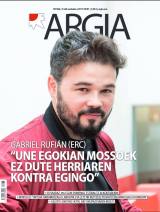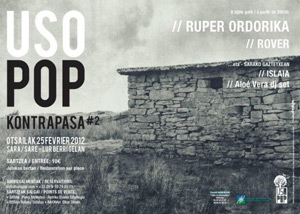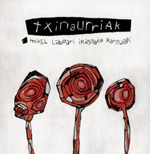"The art that takes you out of the comfort zone is really effective."
- 100% Oyón is a record that defends coexistence and against racist and clasile prejudices. Without losing the trail of Mursego, with clear political letters. Starting with the process until the album is complete, more topics of conversation have been created, such as the mobilizing power of music or the way to understand tradition.

Mursego has completed the 100% Oion project “emptied but satisfied”. “Thanks to Ibon RG and Ander Barriuso, because I’ve finished a stab,” he says. It reminds Borruso of the day it all started, as it is almost two years since then. He nodded without thinking too much of mediator Idoia Zabaleta. “I admire a lot and wanted to work with him.” He then got to know the details of the project: what is an initiative called Nueva Comanditaria de la Fundación Daniel y Nina Carasso: “At one time, only the church or the kings had the power to order the works of art. The initiative, on the other hand, aims to give that power to civil society to meet the needs of the different groups”. The project, which sought to improve the coexistence in Oyón, counted with the collaboration of the foundation, to which they proposed to elaborate a album, and then began a meeting, Whatsapp, headache and beautiful moments, which has been prolonged until recently.
Why Oyón?
It's a border town. Many of them work in Logroño. The unemployment rate stands at 21%, almost half of young people are unemployed. There are many immigrants, especially Pakistanis, Arabs and Gypsies. And they have huge problems with coexistence. For example, the conflict between the public school and the ikastola is very graphic. They're facing each other, separated by a fence. All immigrants are on the public network and at ikastola the others are available to the public. But among the natives everything is polarized: either you're Euskaldun, or you're a pepero. But the peperos take the kids to the ikastola for not taking them to a crowd full of immigrants. And in this panorama emerge Islamophobia, negative stereotypes, such as reduction of school level, hospital collapse, etc., and Zurrumurru, other issues that are mentioned in the song of rumors.
What steps have you taken to complete the songs?
“We have been living from Laboa and Lete for years. You have to break with that.”
After several meetings with Oiondar, Idoia Zabaleta and I produced a file with a list of songs we wanted to do: a children’s song in Arabic, an anti-rumor, a techtno-jota… and then we thought which group of the people could participate. Then we learned that there was a school of bertsos, or the cultural association Irule – which shows trikitixa, txistu, dance, etc. –, rock groups, an assembly of young people… After the summer of last year we started working for Whatsapp, and at the time of choosing the Arab children’s song, Muslim women sent me the current pop songs, very sweetened. I thought to myself: I don't want to do this. Then we met with the wise man of the people of Manolo, who told us what the customs of Oion are.
He's put his voice in a song.
That's it. I really like this process, listening and informing a grandfather. We also met with Arab women. And gradually, as I created trust, I began to ask them, what is it to be a Muslim woman, how they experience the handkerchief -- for example, I realized that the Koran is a self-help book for them in the best sense. It helps them in everyday life. It tells them how to treat their neighbors, how to educate their children. When they are sad, they turn to the Koran for peace of mind. They read me very nice passages. He was wearing San Blas. You know, if you win people out of the casings…
.jpg)
So there was a time to get into his culture.
Yes. In one of those meetings I was sung by the song Tala al badru aleina, which had been sent to me before from Whatsapp, sung by a Dutch choir. Contrary to what was happening then, when they heard the song they were singing, when they were clapping and yelling down the hall, it seemed to me that it had an extraordinary strength. I immediately said, this is the song. The melody was very sticky, very beautiful. But what things are, the Quran doesn't allow them to sing in public. Music is mainly linked to weddings and similar celebrations. Or, if not, it's something familiar or intimate. They can sing, but at most they can use two or three instruments as an aid. We, instead, wanted children and women to sing. So we had a problem. We told them it was in favor of a good cause, in the end they also noticed and ended up singing on the album and in the presentation. The project has been hard and nice.
What have been the most complicated times?
For example, what happened to us with Óyenos Oyón. We wanted to make a chorus of grievances. What is that? For all the anger that gives you a situation is channelled into singing, and in that way rabies becomes a positive energy – we are based on a Helsinki initiative. We conducted a collective survey in the village. In some postcards we wrote two questions. On the one hand, what would you change in your village? In the other, if it was a song by Oion, what song would it be? We left the postcards in the city hall, in the bars, in the schools, in the house of culture... we received about 200 complaints, and based on them we wrote the letter. The choir of the town was in charge of singing the song, but when we sent the lyrics we lit a song. Some choir members rejected the complaints: “My people smack badly,” “there is nothing to do”… they didn’t understand. How can that be said of such a beloved people? They didn't know how to distance themselves or do self-criticism. The director called me telling me that the choir had almost dissolved, but that he fully supported the project. The letter was taken to the full of the city council. Some had become famous all over the country. You do a great job writing a song, the recording is close, and all of a sudden that. It was very hard. We finally had to find people for the choir. And that was the nicest thing: he realized that people really believed in the project, that we rocked the people, that the debate came up, that we gave something to say, that there was a certain movement, and all that served to make the project visible.
The most beautiful moments have therefore been the hard times.
A lot of yes. We also had a problem with the Aurora singers – in Oyón, they go to sing auroros on the eve of Reyes, San Vicente and San Anastasio Day. When they sent the original letter, they replied that it seemed made for kids, that they didn't understand it, that they didn't like it and that they wouldn't sing. The day before the trial. In the end, we told the one who took over the responsibilities of director to write a letter of his liking, and then the atmosphere gradually improved. I had spent the night writing the letter for the next day. A very nice letter, written taking into account the original. I felt moved because the guy believed in us. Then came the one who had come out. We're talking about amateur people.
I think the greatest challenge would be to know to what extent we need to insist on technical issues, to what extent we need to give in.
Of course, I had to be content with myself all the time. I knew I wasn't going to get anything out of what I was thinking. But as a musician, you want a minority, and when you see that they sing challenged, that they don't go with the rhythm -- you have to take it with a lot of philosophy, make you believe that the goal of the album is another. Managing all these things has been difficult, but I am happy with the result. After all, there are many songs by the people, and in the songs by Uztaritze I have tried to reach that level that I had set myself. For example, I really liked how Irulea was left on the tour, or Zurrumurru, Zurrumurru. In such cases, I have taken the license to call my friends: Aida Torres, Karlos Osinaga SanturtziMariano Hurtado, Kau Kori Kura, Amorante…
“Oyón’s neighbors have told me that some small things have changed. For example, those who didn’t do it before are now greeted.”
Has the album served to change something in Oyón?
The public has told me that some small things have changed. For example, those who did not do so before are now greeted. After all, there is a link between those who have tried a song together and others. On the other hand, I've been told that they're able to look the other way, that they empathize more. This record has made me more self-critical, and I think citizenship has also done so. I'd like this project to encourage people to do little things, I know, a party song, and things like that. Music -- art in general -- has many forces to motivate and mobilize people. Even music reaches a point where other artistic disciplines don't reach, you can say with music what you can't say with words. And it's not going to change the world, but Oteiza said -- and I agree -- that art doesn't change the world, but it changes as an artist, and then we are the artists, the people who can change the world. I'm a different person before and after composing something. Every creative process changes the person. On the other hand, Oion’s project has continually taken me out of my comfort zone, and I believe that the art that achieves it is really effective. The concerts that have taken me out of comfort are those that have been recorded in my memory: Festivals of Ertz or, without going any further, the one that Akauzazte gave this year in Galdakao. Of course, I also remember concerts that have amused me a lot, but I think, in general, music doesn't have to be conscious, but an exercise that can become uncomfortable.
I think that in the songs that are made in the corners to mobilize people, a forced epic is often used, always to the detriment of the song.
Yes, and it's a shame, because there are many forms of epic, without falling into the easy epic. For example, Óyenos Oyón's choir of grievances is also very epic, but it's an epic that I really like. That song is adhered to by the epic, regrets and the very nature of the song demands the epic. I'd like the songs that are made to mobilize people to be more than to cry a call to action. There are ways, you can do things beyond the traditional formula. To start with, ask a single group to sing, forgetting the usual collages. Then, try to do something beyond the wind sections of the style of the trikitixa and the ska. It occurs to me, for example, that Berri Txarrak is able to make strong melodies with interesting letters. Or, if not, Kau Kori Kura was sure he would do something nice.
If there's no tears, it's not my revolution.
And that's what we're looking for with the formulas we always have. We have been living from Laboa and Lete for years, in the version of the Enesian birds, both for dance and for theater. You have to break it with that. Why don't we resort to an unknown tradition? Look at the work that Tapia does with the songs of war. There is something to claim. The same grazing, for example. Let's do a recital of poems, or a spoken word, I know what. Let's read it next, let's experiment with it. But let's use that material to do something new. In this way, you work memory, you do something new, you annoy it in your own way, and you make it known to people. At the Oarso Museum, they're doing something like this with Artze. From some of their poems they have prepared exercises for Euskaltegis students, etc. Those things are very interesting. Let museums be active.
I mean, take heritage and do something else, rather than reproduce it as it is.
Or take your spirit, your way of working, and do something with that attitude.
Surely that would be the best way to pay tribute to them.
With Laboa, I think that. If he saw what had happened to his songs, he would give him an attack. On the contrary, if someone started to invent a language, to put a fragment of Bach in a concert, or to move on stage like Chiquito de la Calzada… The key is to recover the essence, the spirit, the way of working, and not the work.
LISTENING
If you want to hear the full 100% Oion album from Mursego, here you have the opportunity.
Kantu politikoak ezaugarri eta gaitegi jakin batzuekin lotu izan dira betidanik Euskal Herrian. Eskema horiek oraindik indarrean badaude ere, bestelako apustuak agertzearekin bat mahaigaineratu da musikan eraldatzaile izateko moduei buruzko eztabaida. Orain eta hemen politikoki... [+]
Mursegoren Hiru diskoko zenbait kantatan antzematen da erabaki politiko bat, Europa zaharrean degradatutzat jotzen ditugun estilo musikalak integratzeko koktel esperimentalean.
Sociolinguists, gurus, all our experts, who constantly tell us that the Basque country has great cultural references, massive cultural products, are blind to the fundamental movement that saves the Basque country. We are at the height of the Basque culture, and we do not see the... [+]
Usopop, Sarako (Lapurdi) Lizarreta mendatean musika berriak eta amalurra uztartzen dituen jaialdia ospatuko da datorren larunbatean. Hirugarren edizio honetan, Ruper Ordorika oñatiarra zuzenean ikusteko aukera izango da, ingurune berezian. Berarekin batera, Rover... [+]
Mursego ::Bi (2)
Bidehuts
iraupena ::49´46´´
prezioa ::10€
















